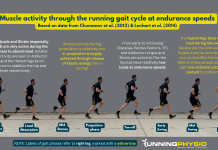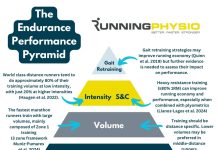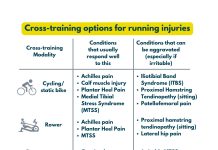Our articles are not designed to replace medical advice. If you have an injury we recommend seeing a qualified health professional. To book an appointment with Tom Goom (AKA ‘The Running Physio’) visit our clinic page. We offer both in-person assessments and online consultations.
Sometimes you just have bad run. A stinker. Everything goes wrong and you consider hanging up your running shoes for good. We all have these but the important thing is we try to learn from them to become a better runner. Today physiotherapist and runner Emmanuel Ovola shares his story…
You can follow Emmanuel on Twitter or Instagram via @Manni_O
I have been running for about 4 years, taking my time to really build progressively and get faster over that period. I started running half marathons with Run Dem Crew in 2012 and ran Paris half marathon in 1.30 in April 2013.
I gradually built my half marathon pace and ran my first marathon in London in 2015 with a time of 3.14. This was all progressing promisingly but I recently completed Manchester marathon and it was a real trail of woe!..
Training started in November, I had prepped my plan and everything was going well. Unfortunately from January to March I started working more evenings and this prevented me from running the easy 10k runs that add maintenance to your program. Instead I did the speed work and long runs predominantly. I was aiming for a sub 3 hour marathon and to run this time a certain amount of mileage is important. I thought running the two most important runs would be the best way to keep me fit and ready for race day but it wasn’t quite enough.
To gauge my ability to run the pace I wanted I did a half marathon 3 weeks out, took it steady and ran a 1.23. Things felt good, I felt confident. Leading up to the race I kept recreating race pace over short distances and tried to get as much rest as possible. Despite this 2 weeks out I got a temperature, I felt intermittently like death (classic ‘man flu’ symptoms!). I was lethargic, never satisfied after eating meals, never rested after sleeping and had a temperature that wouldn’t disappear. It didn’t settle but I thought nothing of it, took some paracetamol and headed off to Manchester.
The preparation leading to the race was not great. Our Accommodation prior to the race was in the middle of the northern quarter of Manchester, which meant sleep was restricted to about 4 hours! On race day, we got to the start line and I was ready. I felt if I could just keep it steady it should be ok. The race started I got comfortable and went through halfway at 1.25, I felt this was the target time. All was going well but suddenly at mile 16 the energy just left me. Like a light switch had been switched off. I was out of power. I crawled around the second half in 2 hours, at times I could not run half a mile. My tank was empty, no matter how many gels or bottles of water I had I was just not able to run. So in the end I finished the race in 3.24 and spent 2 of the next 5 days in bed. No disaster but a long way from the sub 3 hour marathon I’d hoped for.
What went wrong?
My preparation was hindered by work. I did not get enough rest, became ill and was probably chronically fatigued. It didn’t help that I booked accomodation in the least ideal place! It is all a learning curve!
What have I learned?
Marathon’s are a real test of fitness and endurance. You have to prepare for the time you want. Two runs a week is unlikely to be enough to prepare for a sub 3 hour finish. I need to run earlier in the morning so that I could fit in the 10k easy runs and I can’t expect to run fast times when sick.
Recovery is important, especially when working more. It’s easy to get ill if you’re trying to fit everything into a busy schedule. If in doubt take a break and recover before running.
Being in the best shape you can before a race is important so prepare carefully!
For more ‘trails of woe’ see Tess’ story and Running Physio Tom’s training trouble!











Good article but another lesson you could learn is that if training is not optimal because of work or injury you have to change your race plan. Had you changed it you might not have crashed the second half and still had a race you wouldn’t be disappointed in.
Comments are closed.